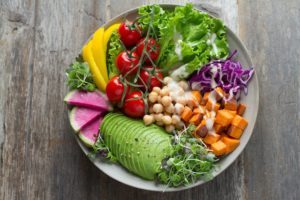Being a woman is amazing!
But it comes with more things to deal with.
From monthly periods to hormonal changes and menopause.
Although menopause is a physiological part of every woman’s life, women have different experiences as they reach the menopause age.
What is Menopause?
 Menopause refers to the time of a female’s life where she stops getting her periods.
Menopause refers to the time of a female’s life where she stops getting her periods.
Research shows that the average age for menopause is between 45 and 55 years of age. [1]
In London, and other parts of the UK, the average age for a woman to reach menopause is 51. [1]
What causes menopause?
Menopause is not a disease or disorder.
It is the physiological result of hormonal changes and decline in the female productive hormones such as estrogen. [2]
It occurs naturally in every woman, but it varies in the age at which it occurs, the menopause symptoms the female experiences.
The time around menopause is called peri-menopause. [2]
It stands for the time of less frequent or irregular periods before menopause actually occurs.
Perimenopause can last for a few months or even a year before periods stop altogether.
But, if your periods have stopped for 12 months in a row, you have completed the transition into menopause. [2]
Is Menopause always natural?
Although menopause is a natural transition, it might occur due to other factors such as:
- Surgical removal of ovaries (oophorectomy)
- Radiation or chemotherapy
- Premature ovarian insufficiency: which results from the failure of your ovaries to produce normal levels of reproductive hormones due to genes or autoimmune diseases. [3]
Meet The symptoms of menopause
 Research shows that menopause symptoms affect 75% of women all over the world, with 25% of women describing their symptoms as severe[4] and women in London are not an exception.
Research shows that menopause symptoms affect 75% of women all over the world, with 25% of women describing their symptoms as severe[4] and women in London are not an exception.
In fact, did you know that in London and the UK, there has been movements suggesting adding a “menopause leave” for women in workplaces.? [1]
And according to the British Menopause Society, there are 4 million women aged 50 and above in employment all over the UK including London. [4]
So, if you are one of those women experiencing these horrible symptoms affecting your daily life, and you are not sure whether they are symptoms of menopause, it is time to learn more and find out for sure what the medical science has to say about this.
Every woman experiences menopause uniquely and in a way different from other women.
Some symptoms might be too mild to even notice, and others might even interfere with your daily activities [5] when your body’s production of estrogen declines, many parts of your body are affected.
Including:
– Your reproductive system:
Reproductive system is directly affected by the decline in your estrogen levels.
This is why you may experience changes in your periods, including changes in flow, menstrual cramps, bloating, period durations and regularity. [5]
– Your brain:
Did you know that around menopause, you might experience symptoms such as alteration in mood, memory and concentration? [5]
– Your skin:
Hot flashes are one of the most common menopause symptoms many women experiences.
They occur because of the decline in your estrogen levels that are thought to affect your brain’s thermostat and lead to increase in your body temperature.
As a result, you may experience sudden feeling of warmth in your face and upper body with redness and flashes on the face.
You may also experience night sweating.
– Your Bones and Joints:
The change in estrogen and other hormones affect your bone health and may lead to decreased bone strength and increased risk of fracture.[5],[6]
In fact, osteoporosis is estimated to affect more than two million women in England [4], and of course, London has a big share of this number.
It is estimated that 1 in 2 women in the UK will suffer a fracture after the age of 50. [4]
In addition to fragile bones, you might also experience stiff joints during your transition to menopause. [6]
– Your Muscles:
Losing muscle mass and feeling easily fatigued can be one of the perimenopause and menopause symptoms. [6],
– Your Sexual Health:
As you go through menopausal changes, you may experience changes in your private parts such as vaginal dryness, discharges, frequent infection, discomfort during sexual intercourse or decreased sex drive. [6]
– Your Sleep:
If your sleep rhythm is affected, you can blame it on the menopause.
The changes in your body hormones can lead to sleep problems, insomnia and poor sleep quality.[6]
Don’t be scared!
No matter what your symptoms are, once you identify them, you will be able to get proper professional support from your clinician’s medical recommendations
Or by adopting a new lifestyle with personal trainer or nutrition expert in London.
Consult now Jazz Alessi for FREE
The Benefits of a Customised Plant-Based Diet for Menopause Women
Believe it or not, changing your diet for menopause can improve your menopause symptoms and regulate your hormones.
 That is right, according to a 12-week study, women who followed a customised plant-based that contains:
That is right, according to a 12-week study, women who followed a customised plant-based that contains:
- More proteins (mainly from soybeans)
- Low fats with focus on healthy fats
- Focus on Complex carbs
- Vitamins and minerals
Improved their hot flashes by 85%. [7]
In addition to improvement in other menopause symptoms such as night sweats, sweating, as well as the psychosocial, physical, and sexual symptoms. [7]
But, this is not the only thing, eating a laser sharp customised diet can also help you improve not only your symptoms, but also:
– Your mood:
Healthy foods play an important role in lifting your mood, combat fatigue and level up your energy levels.
If you focus on foods rich in essential fats (e.g., Omega 3 oils), Vitamin-B and calcium you will notice a major improve your mood.[8]
– Your sleep:
It is impressive that up to 60% of postmenopausal women in the world suffer from sleep
disturbances!
Cause in addition to all the symptoms that might be giving you hard time around bedtime, melatonin secretion declines after the age of 50.
Which also plays a role in poor sleep quality and sleep disturbance.
But good news is, sticking to a customised nutrition diet plan can balance your body’s hormones and help you fall asleep, improve your sleep duration and quality. [8]
– Your stress:
When you hear of a plant-based diet, you automatically think of eating all raw veggies just like a rabbit.
But, what if I tell you that in one study, sixty-six post-menopause women could reduce their anxiety, depression and stress levels by consuming customised plant-based blends and eating yummy cookies made of soybeans. [9]
This proves that you can have customised plant-based –– yet yummy –– foods that are rich in flavonoids, protein, healthy fatty acids, vitamins, anti-oxidants and anti-inflammatory micronutrients that will help you improve your mental health. [9]
– Your Body Composition:
Adherence to a customised plant-based diet can lead to improved hormonal balance and can change how your body feels, looks and functions.
In other words, it will:
- Increase your muscle mass
- Boost your energy levels
- Reduce fatigue.
- Reduce body fat percentage and help in weight management
- Help you get a leaner body
- Improve your bone density, give you stronger bones and fight against osteoporosis [11]
Get ready to a more active version of you, and pack-in more muscles for the most important transition in your life as a female.
All you need is a laser-sharp customised exercise programme.
Speak to Jazz Alessi for a FREE CONSULTATION
Customised Plant-Based Foods for Managing Menopausal Symptoms
 If you think a plant-based diet is about eating raw food, it is time to change this concept.
If you think a plant-based diet is about eating raw food, it is time to change this concept.
A plant-based diet means you abstain from processed foods and added sugar, in addition to animal-source foods including dairy and eggs whilst you will enjoy the tastier and the most effective customised anti-ageing better foods replacements. [8]
In other words, in a smart manner I help you yo successfully reset your body.
Bring it back to the nature and away from added chemicals and harmful foods which are skyrocketing the ageing process that you want it to be to conquered.
At the same time, you still get to eat super tasty foods, vegan broths, cookies, salads, smoothies and blends in addition to several plants-friendly options that are now more available than ever in the markets and restaurants.
But, what foods are good for menopause?
If you are looking for a menopause diet to improve your symptoms and make your transition easier, research shows that amongst other things you could focus on consuming more phytoestrogen-rich foods.
Did you know that these foods have an effect similar to the estrogen in the body? [8]
To put it simply, you can focus on consuming:
- Isoflavones can be abundantly found in soybeans, instead,
- Lignans are found in legumes, vegetables such as carrots and cabbage, fruits such as strawberries, nuts, flax seeds and whole grains;
- Proteins to prevent muscle mass loss (sarcopenia). Good sources of proteins include soybeans, legumes and tofu. [8]
- Vitamins: Focus on fruits and vegetables that are rich in vitamin D, C, E, B and
folate, For example: strawberries, lemon, kiwi, avocado, broccoli, asparagus, spinach, chard, black cabbage, endive and lettuce. - Healthy Carbs: Avoid simple carbs from sugars and sweeteners. Instead, include more complex carbs like whole grains in your diet. [8]
A customised plant-based diet is better and easier to adhere to when it is made specifically for you, and when it includes the food you like.
Get your very own diet plan with London’s number one nutrition expert, Jazz Alessi;
BOOK A CONSULTATION FOR FREE!
FAQ:
1. How long does menopause last?
Menopause usually lasts about seven years but can also be as long as 14 years. The duration varies greatly die to lifestyle and habit differences such as smoking, the age it begins, genetics and ethnicity. [26]
2. What age for menopause?
According to statistics, most of the women reach menopause between 45 and 55 years of age. However, some women may experience early or late menopause. It is most probable that a woman will reach menopause at around the same age as her mother.
3. When does menopause start?
The menopausal period is considered started after you have spent 12 months without getting your period. If you get irregular periods, or you are experiencing menopause symptoms, this is known as peri-menopause.
4. Do men go through menopause?
There is no clear evidence that male hormones decline over time resulting in physiological and physical changes. So, until now, male menopause is considered a myth.
5. Is menopause permanent?
Menopause is not a disease or a disorder, it is a cascade of physiological changes that occur to your body as you age. These changes are irreversible, but the symptoms associated with them will go away over the time.
6. What are some natural remedies for menopause symptoms?
There are many remedies that you can use to ease your symptoms; from shifting to a plant-based diets to changing your lifestyle and becoming more active. However, what you eat and the exercises you should do vary from a person to another according to individual needs.
There is no one-plan-fits-all in Menopause
As I mentioned earlier, every female goes through a very unique experience around her menopause.
For this reason, there is no one plan that fits all women.
In addition, when it comes to menopause, Age is ‘NOT’ just a number!
 Because if you are 50 and you are experiencing symptoms of menopause, your elite personal trainer and London nutritionist will design you a menopause programme to improve your symptoms and help make your transition easier.
Because if you are 50 and you are experiencing symptoms of menopause, your elite personal trainer and London nutritionist will design you a menopause programme to improve your symptoms and help make your transition easier.
But, if you are 30 and experiencing symptoms of menopause, your London personal trainer would not do the same and you cannot follow the same programme!
Instead, he will refer you to a clinician who would look further into the reason why you are getting a pre-mature menopause.
Moreover, if you have any medical conditions, it is important to keep your personal trainer informed.
Because, for an expert personal trainer, every detail matter.
For instance, if you have kidney problems, your personal trainer and nutrition expert will be cautious while adjusting your protein as a part of your menopause diet plan to avoid stressing your kidneys.
By making laser-sharp customised menopause diet plans, Jazz Alessi will help you completely and safely transform your body within 12 weeks and will make your transition to menopause way easier.
Who is Jazz Alessi?
Jazz Alessi is an expert nutrition and rehabilitation specialist who does not have a template-plan for his clients.
Instead, he puts time and effort into listening to you, understanding your likes, dislikes, problems, medical history, lifestyle and future goals.
Based on what you say, doctor reports and one-to-one assessment sessions, Jazz Alessi formulates a custom-made exercise and menopause diet plan to meet your own goals and tackle your own problems.
References
1- Menopause and the workplace 2022-23 report – UK Parlimant https://publications.parliament.uk/pa/cm5803/cmselect/cmwomeq/91/report.html
2- Burger, Henry. (2006). Physiology and Endocrinology of the Menopause. Medicine. 34. 27-30. 10.1383/medc.2006.34.1.27.
https://www.sciencedirect.com/science/article/abs/pii/S1357303906002994
3- Mayo Clinic –– Menopause
https://www.mayoclinic.org/diseases-conditions/menopause/symptoms-causes/syc-20353397
4- British Menopause society
https://thebms.org.uk/2021/08/the-british-menopause-society-response-to-he-department-of-health-and-social-cares-call-for-evidence-to-help-inform-the-development-of-the-governments-womens-health-strateg/
5- Zubrzycki, Igor & Wiacek, Magdalena & Greiner, Ted. (2013). Menopause-Related Physiological Changes and Their Possible Control Through Diet and Exercise. 10.1007/978-1-62703-373-2_3.
https://www.researchgate.net/publication/260365805_Menopause-Related_Physiological_Changes_and_Their_Possible_Control_Through_Diet_and_Exercise
6- Iwanowicz-Palus, Grazyna & Świst, Dorota & Skurzak, Agnieszka & Polska, Paulina & Stobnicka, Dominika. (2019). Impact of menopause on women’s health. Medycyna Ogólna i Nauki o Zdrowiu. 25. 1-5. 10.26444/monz/105617.
https://www.researchgate.net/publication/332067137_Impact_of_menopause_on_women’s_health
7- Barnard ND, Kahleova H, Holtz DN, Del Aguila F, Neola M, Crosby LM, Holubkov R. The Women’s Study for the Alleviation of Vasomotor Symptoms (WAVS): a randomized, controlled trial of a plant-based diet and whole soybeans for postmenopausal women. Menopause. 2021 Jul 12;28(10):1150-1156. doi: 10.1097/GME.0000000000001812. PMID: 34260478; PMCID: PMC8462449.
https://www.ncbi.nlm.nih.gov/pmc/articles/PMC8462449/
8- Laudisio D, Barrea L, Pugliese G, Aprano S, Castellucci B, Savastano S, Colao A, Muscogiuri G. A practical nutritional guide for the management of sleep disturbances in menopause. Int J Food Sci Nutr. 2021 Jun;72(4):432-446. doi: 10.1080/09637486.2020.1851658. Epub 2020 Nov 30. PMID: 33253056.
https://pubmed.ncbi.nlm.nih.gov/33253056/
9- Fouad S, El Shebini SM, Abdel-Moaty M, Ahmed NH, Hussein AMS, Essa HA, Tapozada ST. Menopause Anxiety and Depression; How Food Can Help?. Open Access Maced J Med Sci [Internet]. 2021 Jan. 6 [cited 2023 Feb. 11];9(B):64-71. Available from: https://oamjms.eu/index.php/mjms/article/view/5555
10- Lombardo, Mauro & Rizzo, Gianluca & Feraco, Alessandra & Perrone, Marco & Bellia, Chiara & Caprio, Massimiliano & Lauro, Davide & Bellia, Alfonso & Padua, Elvira. (2021). High plant-based diet and physical activity in women during menopausal transition. Nutrition & Food Science. ahead-of-print. 10.1108/NFS-06-2021-0195.
https://www.researchgate.net/publication/355117490_High_plant-based_diet_and_physical_activity_in_women_during_menopausal_transition



